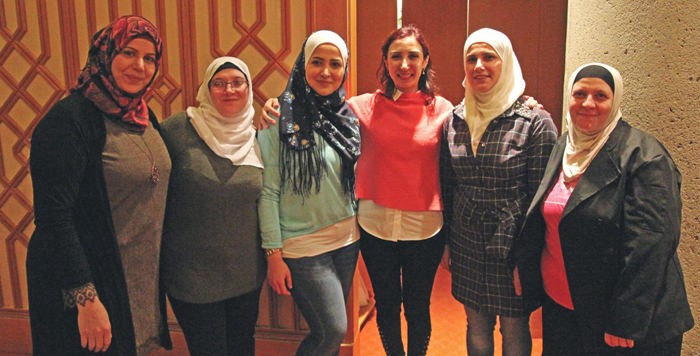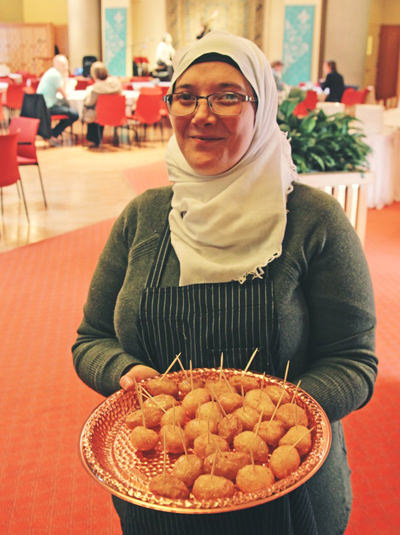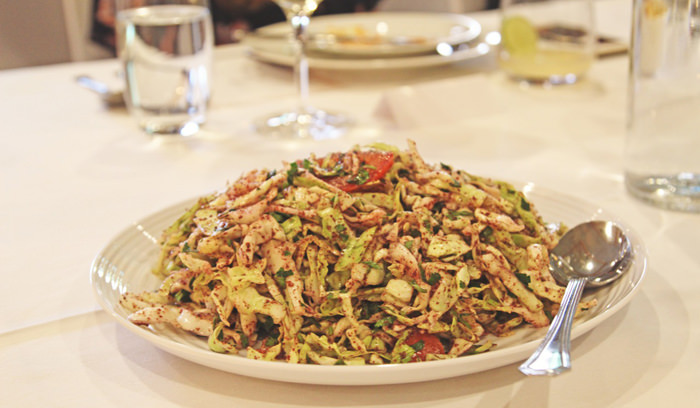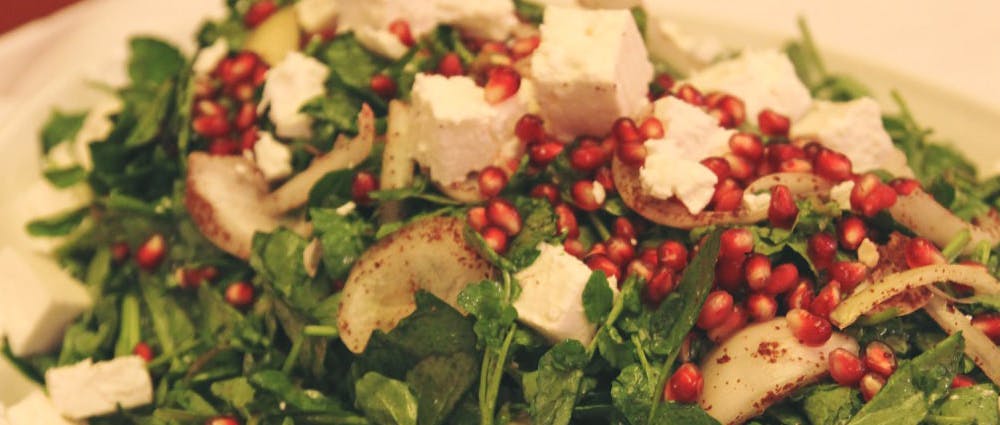Tayybeh’s Kind and Ambitious Cuisine
Meet the refugee women taking Vancouver by storm with their cooking, and try one of their Syrian recipes at home!
A jarjeer salad of watercress, cheese, onion and pomegranate, served at Tayybeh’s Senses and Serenity pop-up dinner.
The Arabic word tayybeh is the feminine construction of a term that means both “kind” and “delicious.” It is also the chosen name of a group of Syrian women who — outfitted with a punchy pink logo — have launched an impressively enterprising culinary collective. As refugees recently arrived in Vancouver, these women are sharing a cuisine that’s still relatively unknown to North Americans, introducing locals to food as diverse and ambitious as the women creating it.
Organized by Nihal Elwan, a Cairo-born international development consultant, Tayybeh started in October 2016 with the help of a small grant from the Vancouver Foundation. Initially, Elwan planned to host a single dinner featuring the cooking of several newly arrived Syrian women. Despite having no budget for marketing, the dinner sold out quickly. Its overwhelming success spawned a monthly pop-up series hosted in churches and community centres around Metro Vancouver.
In addition to Elwan, the core Tayybeh membership now includes: Hasne Shekh and Heba Najib, a mother and daughter from Aleppo; Raghda Hassan and Majida Hamdo from Latakia; and Maha Almaarabani from Damascus. Each of Tayybeh’s chefs brings her own region’s traditions to the table, so the repertoire the collective has to pull from is vast and colourful. As Elwan puts it, Tayybeh is a chance for the women to “run wild in the kitchen and flex their culinary muscles.”
Even if unfamiliar, Syrian cuisine is instantly comforting: a culinary canon refined over millennia that only continues to evolve.
The food of Syria is storied and diverse, influenced by its location along the Silk Road as well as centuries of conquest by various empires, including the Persians, Byzantines, and Ottomans. Regionally distinct, it has swapped culinary customs with many of its neighbours — most notably Lebanon, as demonstrated by the popularity of dishes like kibbeh and tabbouleh in both countries. Syrian food is tangy and bright, with contrasting smooth and crunchy textures, warm spices, cool yogurts, sour flavours, fresh herbs, and syrupy sweet desserts. Even if unfamiliar, it is instantly comforting: a culinary canon refined over millennia that only continues to evolve.

The women of Tayybeh learned to cook from scratch from their mothers, mothers-in-law, and sisters, and they are very good at what they do. Dishes like their tart and zesty malfoof (a sumac-laden salad — recipe below) and shakriya (fork-tender slow-cooked beef in yogurt sauce) are perfection. Tayybeh’s food is also beautifully presented, garnished with finely curled lemon peel or tomato roses, patterns of chopped fresh parsley, and handfuls of glittering pomegranate seeds.
In the past six months, the collective has expanded beyond their sell-out monthly dinners into catering, and at a pop-up dinner in March surveyed diners about which Tayybeh products they might purchase from a grocery store. This, despite the fact that the core members (excepting Elwan) have been in Vancouver for only two years or less, and are still learning English.
Their culinary ambition is notable, not least because it’s as new as the venture. Elwan says the women of Tayybeh didn’t think of their cooking skills as marketable before that first dinner. They weren’t chefs; they were mothers, daughters, and sisters cooking for their families. Tayybeh was the first opportunity any of them had to cook outside the home and earn money for it.
Their families have embraced this update of traditional gender roles. At a recent Tayybeh dinner, Elwan asked the crowd, “You know the phrase: ‘Behind every great man is a great woman’? Well, behind every one of these great women is a great man.”

Tayybeh’s English-speaking team members make sure to draw attention to the individual strengths of their chefs. At the end of the recent Senses and Serenity dinner — Tayybeh’s largest and most elaborate pop-up to-date — Elwan introduced each woman to the guests. She began by bringing Hasne Shekh, their matriarch, to the front.
Also known as Om Omar (“Mother of Omar”), Shekh is small and shy, the group’s resident kibbeh expert from Aleppo. “Tender, loving, and sensitive,” Elwan said, “she possesses the unique ability to make us cry and laugh at the same time.” She was joined at the podium, as she is in the kitchen, by daughter Heba Najib — one of three of Shekh’s adult children here in Canada (the other four remain in Syria or Turkey). Recently married, Najib is considering scaling back her role with the collective.
Next up was Raghda Hassan from the coastal city of Latakia. In Vancouver for only the last year and a half, she’s known as the “Queen of Diplomacy.” She loves cooking Latakian mloukheya, a dish made from the dried leaves of tossa jute, which, when boiled, produce a texture similar to okra. “Thank you so much,” she said in Arabic, translated by Elwan. “We hope to be better and better every time with you supporting us.”
After Hassan came Maha Almaarabani, tall with dimples and a mischievous smile. She left Damascus for Egypt when the war started, and came to Canada four years later. Elwan described her “wicked sense of humour” and told guests Almaarabani is “impeccably organized. Nobody messes around with her in the kitchen.” Almaarabani specializes in harra’ esbaou, a winter lentil dish. The name translates to “burned finger” because, the story goes, peasants were so eager to eat it, they wouldn’t let it cool down before digging in.
Last came the youngest and newest member of the group — Majida Hamdo — affectionately referred to as “The Diva” for her beauty. Also from Latakia, she is “intuitive, feisty, and takes on some of the most complicated tasks in the kitchen,” according to Elwan. Out of five siblings, she is the only one who came here with her parents. Despite having been in Vancouver for less than two years, Elwan says she “hit the ground running.”
Hamdo is responsible for Tayybeh’s famous “beehives”: beautiful trays of pull-apart buns filled with fresh white cheese and topped with black sesame seeds. She also thanked the guests: “Every time you come and see us we become happier and happier.”
At the end of the Senses and Serenity dinner, a short film was screened, following a group of Syrian refugee kids looking for a public pool in their new hometown. The film ended with the revelation that the brother of two of the kids — himself still in Syria — had been shot, and may have died.
Elwan reminded the audience that this is a daily reality for the Tayybeh chefs and their families. Three of the women are mothers, and collectively the five Syrians have plenty of grown children, siblings, relatives, and friends back home whose wellbeing is a constant cause for concern. These women know a type of hardship unfathomable to most of their guests.
They also know how to cook. Despite the stress of starting anew while still emotionally connected to war, their resilience has allowed them to thrive through their work. These women are ambitious. These women are kind. And the food they make is delicious.

Recipe: Malfoof salad
(Vegan, gluten-free)
This salad is citrusy, tangy, and fresh, and works well as a complement to roasted meats or other rich mains.
- Half a small red cabbage, finely sliced
- Half a small green cabbage, finely sliced
- 2–3 ripe tomatoes, seeds and core removed and sliced into thin wedges
- Large handful fresh mint, finely chopped
- Large handful fresh flat-leaf parsley, coarsely chopped
- Juice of 1 lemon
- 1–2 tablespoons olive oil
- 1–2 tablespoons sumac
- Salt, to taste
Mix all the ingredients together in a large bowl, and let rest for about 10 minutes. Taste, and season further with more mint, oil, lemon juice, sumac, and/or salt, as needed.
